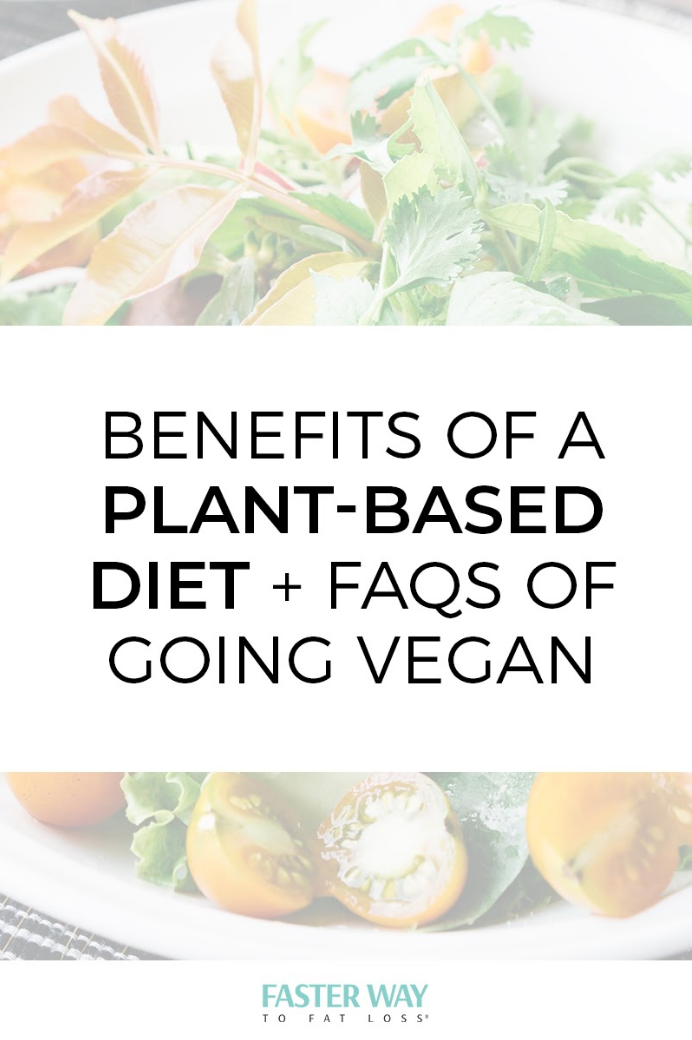The benefits of a plant-based diet are undeniable, but most people have a lot of questions when they transition to a vegan lifestyle. We’re answering frequently asked questions to help you feel confident about going plant-based.

According to the Centers for Disease Control, 647,000 Americans die from heart disease every year. That means 1 in every 4 deaths is caused by heart disease! The worst part of this statistic is that, in many cases, these deaths are preventable through a healthy diet and active lifestyle.
We recorded a special training for our FASTer Way VIP Membership about this topic, and there was so much good information that we put it on the podcast to share with even more people.
Listen to the full episode here!
A plant-based lifestyle, or even adding more plant-based foods to your diet, is a powerful way to improve your health and reduce your risk factors for many diseases. But we also know that it can seem overwhelming to change the way you eat. The good news is, you don’t have to do it all at once, and even adding a few extra veggies every day will be beneficial! As we say in the FASTer Way, there is NO downside to eating more veggies!
Benefits of a Plant-Based Lifestyle
There are many benefits to a plant-based lifestyle! Many people experience:
Increased energy
Clearer skin
Improved digestion
Lower blood sugar levels
Improved kidney function
Reduced risk of heart disease, obesity, dementia, and certain cancers
Immune support
Reduced inflammation
Support of healthy gut bacteria
There are a number of different terms related to plant-based eating, which can get a little confusing! The main terms used include:
PLANT-BASED focuses entirely on plants and excludes meat, fish, dairy, and eggs.
VEGAN focused on plants. It excludes meat, fish, dairy, and eggs, but encompasses plant-based food products that may or may not be health-forward.
VEGETARIAN is also plant-based, but its menu may include dairy and eggs.
FLEXITARIAN is a vegetarian that sometimes includes meat or fish but mostly sticks to plant foods.
PLANT-FORWARD emphasizes plant-based foods but is not strictly limited to them. Meat may be included but it’s usually not the main feature of the meal.
There are plenty of “vegan junk foods” which is why we use the term plant-based (did you know Oreo® cookies are vegan??). We want to make the distinction that we focus on plant foods filled with important micronutrients.
What about SOY?
There’s been a lot of debate in the plant-based world about soy and the phytoestrogens (or plant-based estrogens) it contains. Estrogen plays a role in everything from breast cancer to sexual reproduction, and it was thought that cancer patients should avoid it. According to this study published on PubMed, “These data do not support concerns about effects on reproductive hormones.”
Answers to FAQs about Plant-Based Eating
Protein. You can absolutely get enough protein on a plant-based diet. Rather than stressing about hitting your gram goals exactly, strive for balanced macros instead.
FASTer Way Low Carb Day. Aim for 50g net carbs or less, but it’s okay to go over. Many people stay within the 75g–100g range. If you have any questions, be sure to ask your FASTer Way coach.
FASTer Way Macro Splits. If you need to go back to the 50C/30F/20P macro split, that’s okay. If you can stay with the 45C/30F/25P macro split, that’s great! If you have any questions, be sure to ask your FASTer Way coach.
Soy and Cancer. More and more research is showing that the phytoestrogens in soy are actually protective. Don’t be afraid to eat soy, tofu, tempeh, etc.
Collagen Peptides. Many brands are animal-based and would not be considered vegan. Sunwarrior DOES produce a plant-based collagen peptide, which you can find on Amazon.
B12 and B Vitamins. Everyone should be taking a B12 supplement no matter what kind of diet they eat. B12 is found in the soil—it does not occur naturally in animals, they are supplemented with B12.
Gas. People are gassy, not food. Our bodies might have to adjust to consuming more fiber. It’s okay to start slow and gradually increase fiber intake. We should be eating at least 25g of fiber each day!
Progress over perfection. Be open to trying new things!
To learn more about going plant-based and what it could do for you (especially from an athletic standpoint!), check our article How Going Vegan Could Be A Game Changer.
To read more research and information about plant-based eating, check out these articles:
A Review of Plant-based Diets to Prevent and Treat Heart Failure
A plant-based diet and coronary artery disease: a mandate for effective therapy
The power of a plant-based diet for heart health
Do YOU eat a plant-based diet? Tell us in the comments!

* This article was originally published here
No comments:
Post a Comment